Are The Life, Relationships, And Connections On Social Media Real Or Fake?
"I feel the day that technology will surpass our human interaction. The world will have a generation of idiots." - Albert Einstein
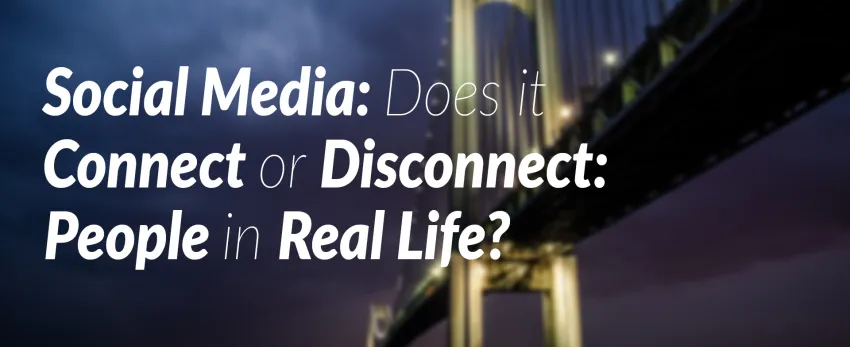
How does social media make us more connected virtually and disconnected from real-life relationships?
Social media has become a reality, a reality the young generation cannot imagine their life without it. Even those people born and raised before social media was invented and technology had not taken such an enormous role in our lives, and everyday activity, cannot live without it.
Social media sites such as Facebook, Twitter, Instagram, and many others have created a connection between people all over the world, bringing home our loved one just a click away.
It is a great advantage to communicate, share views, feelings, photos, and get feedback. It has enriched our lives like never before. Through Facebook and Twitter, people can stay informed about any news and what is currently happening across the world.
Social media and its connection can be beneficial for a wide range of activities like seeking a new job, location assistant, free advertising, or creating a fundraiser, and many other activities good and bad alike.
Technology and the internet have connected people all over the world like never before, but they are connected to their laptops, smartphones and have forgotten the real relationship with one another in the real world.
As per the interview of social psychologist Sherry Turkel, Ph.D., she has related that people who change the real world for the virtual one, spending their precious time connecting online become more isolated than ever in their real life.
People use their smartphones without being conscious of it, scrolling down in their social media to see their friends and virtual friends from the screen. Studies reveal that meandering down into social media is not a motif to connect with certain friends and relatives, it is an attempt to break out their loneliness.
There are different studies conducted about the effect social media has on our health, one of these studies explains social media's role in seeking connectedness vs. avoiding social isolation.
Participants had to report social media use, face-to-face interaction, perceived social isolation, social connectedness, and subjective well-being. The researchers revealed that face-to-face interaction led to improvement of subjective well-being by simultaneously increasing connectedness between people and decreasing social isolation.
However, social media only increased subjective wellbeing through increasing connectedness, but it didn't decrease social isolation. Social isolation can gradually creep into our lives if we do not find more effective methods to decrease our feelings of social isolation and loneliness.
Psychologist Robert Weiss states that there is a difference between "social loneliness" - not having contact with others, and "emotional loneliness", which can increase despite having too many "connections", especially if you don't get emotional support, to affirm identity and create feelings of being loved, cared and appreciated.
How social media is a distraction from the real world?
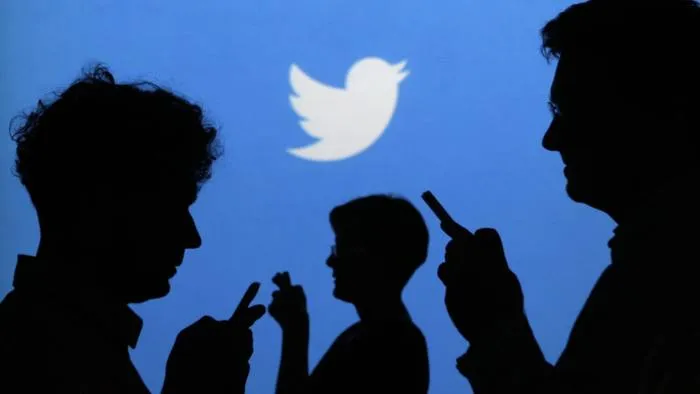
In today's world, people are living at the peak of technological advancement. Technology has become a huge factor that distracts people from real-life communication and loses them into Facebook, Twitter Instagram, or any kind of social media. Some people have multiple tabs open on their computers and devices being online all the time and receive notifications from them.
Instead of bonding with one another in real life, social media has created a disconnection, mental fatigue, and anxiety. It has chained us into the fake virtual world and separated us from ourselves.
People are dragged from real-life communication, leaving people aside and retreat into virtual communication. Even though they are present physically with one another in their gatherings, whatever they may be, they are mentally focused in the virtual world living aside from each other in the real world.
There are people also who use their devices while they are driving, putting themselves and others in danger. Technological advancement has indeed created opportunities for people to be more productive and communicate with their loved ones more easily, but they have become a huge source of distraction for people in a considerable way, which has resulted in negative mental and physical consequences.
If your brain is distracted from a notification, then it has to pay a price, because it takes 23 minutes to get back your attention to the task you were doing previously. It means that you, due to your distraction from social media, could be losing 30 minutes when your focus has been reduced.
How does it affect your mental health?
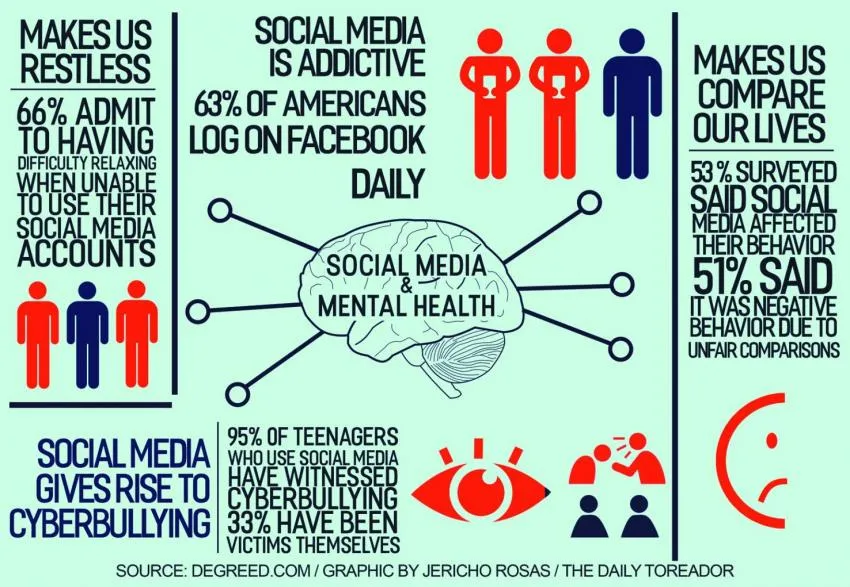
Social media has become a source of popularity among its users, especially when they start to compare themselves with one another. But how does this comparison and popularity in the virtual world affect mental health in the real world or life?
When people use social media, their brain reward center releases dopamine, which is a chemical or neurotransmitter linked to activities that give you pleasure such as sex, food, addictive drugs, and social interaction. These platforms were created to be addictive to keep people chained to them, and are associated with anxiety, depression, and even physical health issues.
As per the research conducted by Harvard University, they relate our brain chemistry and self-disclosure on social networks having the same effect on our brains as addictive substances like drugs. Psychological researchers suggest that social addiction finds its roots in our age, and the desire to increase self-esteem.
But the question is what makes them go back to social media when it actually is harming them? Just like gambling, believing there is a chance for enormous gain makes them go back to this activity. The same goes for social media, people go there to get a boost of self-esteem, a feeling of belonging in their social circles. They post their content to get positive feedback, adding this with the great future reward, it only generates traffic in the social media circles.
A British study conducted in 2018, has connected social media use, with sleep problems, signs of depression, memory loss, and a decrease in academic performance. Due to social media use the young generation is losing interest in school, work, and favorite activities they used to do.
The effects social media has on teens
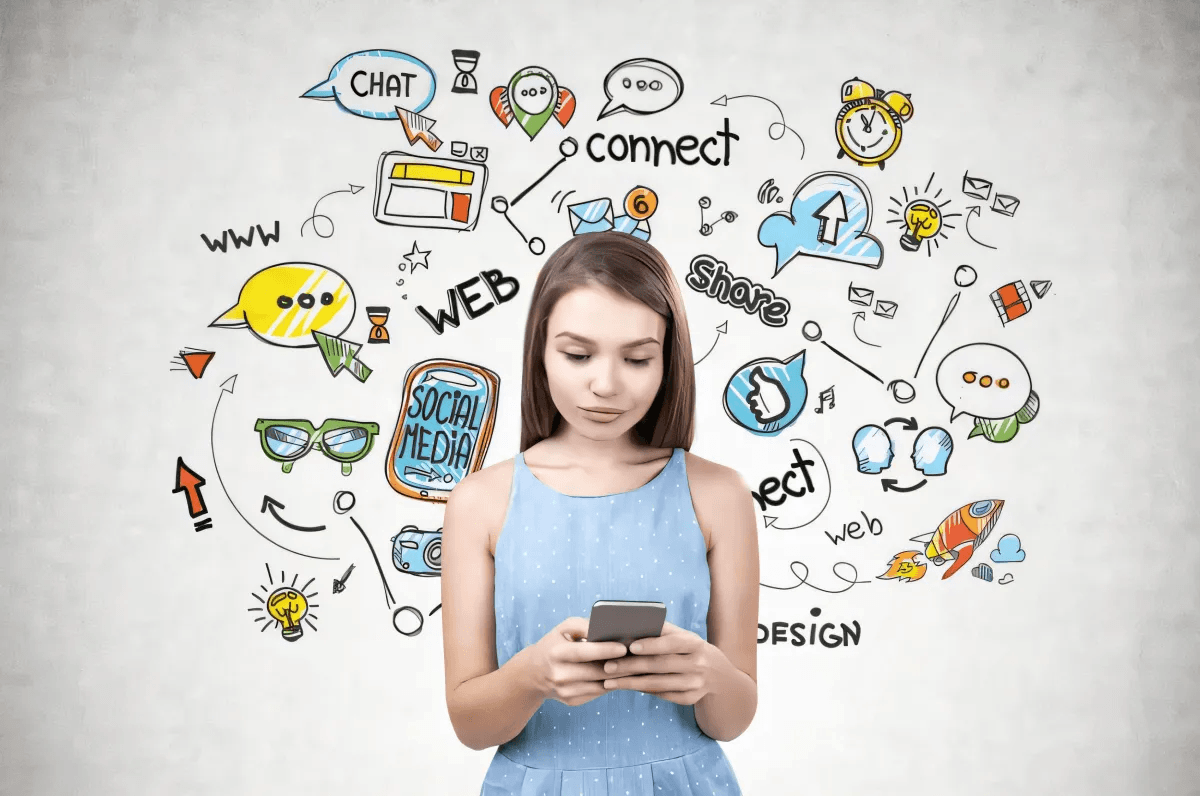
Teenagers are the ones that use social media the most, but there is a race of comparison of themselves with others which affects them negatively. Researchers have not come up yet to a conclusion on whether social media is damaging the mental health of teens or not.
Some studies related social media with a positive impact on teens, being part of a small social circle benefits them for the better, while others connect social media with anxiety, depression, and eating disorders.
A recent survey of US teens and young adults on social media use and its effect on mental health has reported that 15% of social media made them more depressed, stressed, and anxious. A fourteen years old Caucasian boy reported that when he is feeling stressed, depressed, and anxious, social media only makes things worse.
However, among those teenagers involved in the study there is a young teenage girl of 16 years old who shared her views about social media effects and experiences:
"I had been having a really rough week. My depression had been really bad and I was feeling really stressed and anxious about school. I posted on Instagram about my struggles with my classes and how I was feeling, and I was met with lots of encouraging words. Someone even direct messaged me and told me they were going through a similar situation. It really helped me pick myself up."
Teens compare themselves with one another on social media, and this has created a problem with their body image. The University of Pittsburgh School of Medicine has related the time young adults spend on social media with problems sleeping and symptoms of depression.
Although social media has some benefits for people, it still has to be used with caution, like any drug that you may need when you are sick, getting an excessive amount of it may cause you severe problems, the same thing goes with social media.
Many risks have been overlooked by parents, teachers, and young people themselves. Obsessive use of social media by teens can cause ADHD, impulsive disorder, disruption of proper mental functions, paranoia, and loneliness.
Students that have restricted social media use to 30 minutes a day have shown fewer symptoms of depression and loneliness after just three weeks.
If you read researches you will realize social media has more negative outcomes than positive ones. To start, cyberbullying, trolls, toxic comparison, lack of sleep, less face-to-face interactions, just to name a few.
- Likes: Their need to gain approval and positive feedback has made teenagers alter their physical appearance, involving them in negative behavior, and undertake dangerous challenges.
- Cyberbullying: Cyberbullying through social media has put teen girls at higher risk, although teen boys are not excluded. It can lead to depression, anxiety, and increase suicidal thoughts.
- Making comparison: Teens are aware they show in social media only the best of themselves, but still, it is difficult to avoid such a thing. They compare themselves with others from physical appearance to everyday life experiences, failures, and success.
- Having too many fake friends: They are a source of getting likes, positive feedback, but your life is exposed and there is no privacy on social media.
- Less face time: To develop social interaction skills, you need practice, teens also. It is hard to develop empathy and compassion which are the best weapons to fight bullying when they engage online rather than in person. Human connection is crucial in our everyday life and it builds skills that are needed throughout our lifetime.
What are the negative and positive effects of social media?
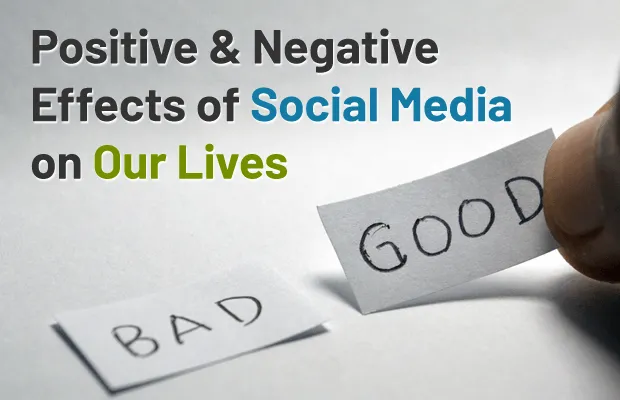
Social media has become a part of our life? It is a technological innovation that has changed our lives like never before. It has connected people across the globe, but like every innovation, It carries negative and positive outcomes.
Pros of social media
The most positive outcome of social media is the connectivity it has created across the world. You can stay connected with your family and friends worldwide, they are just a click away.
Facebook, email, Skype, etc, can bring our loved ones into our homes. Technology has enabled us to get quick access to any kind of information and research. Now we can pay our bills and do banking transactions through or cell phones.
Social media has become a source for online learning job skills, content discoveries, by navigating into social media platforms people can involve themselves in civil rights moments, they can use it as a marketing tool, or an opportunity for remote employment.
Cons of social media
For the same factors, social media has become a positive tool to make our life better, in the same way, it can be used for negative and dangerous purposes. For example, being anonymous can allow you to cyberbully anyone, which is a grave problem among teenagers.
Bullies humiliate the most vulnerable peers, and can very easily get away with it. Stalking is another issue because people post their whereabouts and it is quite easy to monitor them.
Social media can unite people together for constructive reasons, however, it can make people dissatisfied, disgruntled, and very easily can misguide them, uniting them together for destructive reasons. Social media can feed negative attitudes and beliefs, or incite people to do dangerous crimes.
One of the most important concerns of social media's negative effects is the poor mental health of young people. Infinite scroll and algorithm are designed to provide related interest to keep people on these sites as much as possible. It has become an obsession that made people sacrifice their precious time on social media and mental health suffers.
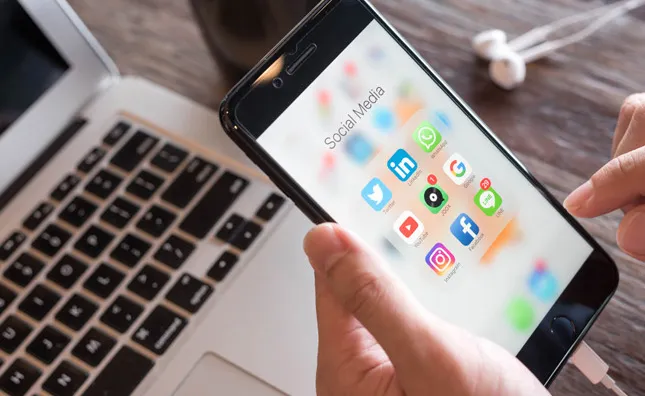
Why do people post everything on social media?
Social media was created to connect people. It is a social world created of likes, hearts, and emotions, they make our day. But we have changed it day by day. Social validation has become crucial in our lives, being afraid of judgment by peers, or missing out on a new trend has turned us into social addicts, which is a physical and psychological addiction, affecting our lives negatively by losing the real world for an illusionary one.
All people want a platform to showcase their life and themselves. It's just human, and social media enables this perfectly, where the popularity of a person is measured by the number of likes, comments, and followers.
The society we live in is made of people who need to show off and increase their popularity by followers and likes. Social sites are a great platform to compare ourselves and to showcase our self-esteem
Does social media make my life better or worse?
The most prevalent reason teens use social media is the feeling of connectedness it gives them, staying informed about their friends' lives and feelings. Teens tend to trust more their peers and smartphones enable this quite simple. Some of the pros of social media are: having an opportunity to showcase technological savvy and creativity.
Introverts who find it hard to adapt to society can increase their self-confidence by expressing their ideas, and the ability to make friends for life. Using technology and mass media can enable people to stay informed, collaborate in many innovative ways, or just keep in touch with their loved ones, but these connections can be very easily used for dangerous crimes and cybercrime.
Another advantage is that social media can allow you to spread information quickly, and learn about anything you want to learn while simultaneously this information can be misused or people can spread misinformation and develop bad values. But sometimes the positive effects of social media are overshadowed by its negative effects.
Addiction, mental health problems, jealousy, unhealthy comparisons, might destroy our life, especially the life of the most vulnerable, the children, teens, and young adults. Studies reveal that the most successful and widespread social media are linked to bullying, body image issues, and fear of missing out. Furthermore, social media is linked to depression and anxiety. There is an increase in mental health disorders and suicidal thoughts among teens and young adults.
Just like in many areas, we don't have enough information and evidence to come up with the right conclusion. However, the best conclusion we agree on is that social media affects people differently, it all varies on their pre-existing conditions and personality traits. Just like food, gambling, sex, or any other temptation, too much of something can be bad, it is always better to stay moderate. But simultaneously it is wrong to say that social media is totally a bad thing.
Social media can bring a huge variety of advantages to our lives, but I would like to say that social media can be of benefit to those people who understand how to use it for the advantages it offers and protect themselves from the dangers it poses. To conclude, people in general, and inexperienced young generations must be educated on how to use social media moderately to get the best of it and protect themselves simultaneously from its dangers.
References:
- Albert Einstein quoted on Pinterest. "I fear the day that technology..."https://www.pinterest.com/pin/385480049327179804/
- BBC. Is social media bad for you? The evidence and the unknowns. BBC.n.d. https://www.bbc.com/future/article/20180104-is-social-media-bad-for-you-the-evidence-and-the-unknowns
- Dalomba, Frances. Social Media: The Good, The Bad, and The Ugly. Lifespan. February 3, 2020. https://www.lifespan.org/lifespan-living/social-media-good-bad-and-ugly
- Express News Service. Social media sites help to connect to people worldwide. The Indian express. February 16, 2015. https://indianexpress.com/article/cities/mumbai/social-media-sites-help-to-connect-to-people-worldwide/
- Ford, Joe. How social media makes my life better worse? AnswerToAll. May 7, 2021.https://answerstoall.com/language/how-social-media-makes-my-life-better-worse/
- Gilchrist, Kate. For better or worse: How does social media affect young adults' well-being? LSE Department of Media and Communications. October 31, 2018. https://blogs.lse.ac.uk/parenting4digitalfuture/2018/10/31/for-better-or-worse-how-does-social-media-affect-young-adults-well-being/
- Hackensack Meridian. The Good and in-between of Social Media. Hackensack Meridian Carrier Clinic. n.d. https://carrierclinic.org/2019/08/08/the-good-bad-and-in-between-of-social-media/
- Haynes, Trevor. Dopamine, Smartphones & You: A battle for your time. HARVARD UNIVERSITY. The Graduate School of Arts and Sciences. https://sitn.hms.harvard.edu/flash/2018/dopamine-smartphones-battle-time/
- Hurley, Katie. LSAW. Social Media and Teens: How Does Social Media Affect Teenagers' Mental Health PSYCOM. Last updated Nov. 16, 2020. https://www.psycom.net/social-media-teen-mental-health
- McLean. The Social Dilemma: Social Media and Your Mental Health. McLean. Harvard Medical School Affiliate. February 9, 2021. https://www.mcleanhospital.org/essential/it-or-not-social-medias-affecting-your-mental-health
- Montare Behavioral Health. Social Media and Mental Health: What are the Positive and Negative Effects? Montare BEHAVIORAL HEALTH. n.d. https://montarebehavioralhealth.com/social-media-and-mental-health-what-are-the-positive-and-negative-effects/#
- Patulnny, Roger. Associate Professor. Does social media make us more or less lonely? Depends on how you use it. THE UNIVERSITY OF WOLLONGONG. AUSTRALIA January 22, 2020. https://www.uow.edu.au/media/2020/does-social-media-make-us-more-or-less-lonely-depends-on-how-you-use-it.php
- Price, Michael. Alone in the crowd. AMERICAN PSYCHOLOGICAL ASSOCIATION. June 2011. https://www.apa.org/monitor/2011/06/social-networking
- Saxbe, Darby PH.D. The Social Media Disconnect. Psychology Today. February 26. 2018. https://www.psychologytoday.com/ca/blog/home-base/201802/the-social-media-disconnect
- Security.org Team. Is Social Media Ruining Your Life? security.org. October 25, 2019. https://www.security.org/resources/is-social-media-ruining-your-life/
- SOCIOLOGY GROUP. Why do we want to share everything on social media? SOCIOLOGY GROUP. n.d. https://www.sociologygroup.com/why-do-we-want-to-share-everything-social-media/
- The Techportal. Why are we so distracted by technology? The Tech Portal. n.d. https://thetechportal.com/why-are-we-so-distracted-by-technology/
Opinions and Perspectives
We really need to start treating social media addiction as seriously as other forms of addiction.
The impact on empathy development in younger generations is something we should all be concerned about.
Interesting how social media both connects and isolates us at the same time.
The article's conclusion about understanding how to use social media wisely is key. We need better education about this.
That point about FOMO driving social media addiction really resonates with me.
We're living in a strange experiment where technology is reshaping human interaction in unprecedented ways.
The study linking social media to memory issues explains a lot about why I can't focus like I used to.
Social media is like a tool. It's not inherently good or bad, it's how we use it that matters.
The research about loneliness increasing despite more connections perfectly describes modern life.
I appreciate how the article emphasizes moderation rather than complete abstinence from social media.
The part about teens altering their appearance for likes is heartbreaking. We're creating such unnecessary pressure.
It's scary how much personal information we willingly share online without thinking about consequences.
The article mentions social media uniting people for both good and bad causes. We've definitely seen both extremes lately.
I've started leaving my phone in another room during family time. It's made a huge difference in our interactions.
The section about social media affecting academic performance rings true. It's hard to focus with constant notifications.
I miss the days when we could just enjoy moments without feeling the need to document everything.
Anyone else notice how social events are now just people taking pictures for social media?
The research about face-to-face interactions decreasing isolation makes me want to prioritize real meetings over virtual ones.
Social media makes everyone else's life look perfect, even though we know it's not reality.
The article's point about emotional support versus mere connections is crucial. Having 1000 followers doesn't equal having real friends.
I've noticed my anxiety levels drop significantly when I take breaks from social media.
The comparison to drugs and gambling is eye-opening. We don't treat social media addiction seriously enough.
That statistic about 15% of teens reporting increased depression from social media seems low based on what I've observed.
The part about social media affecting sleep really hits home. I'm trying to stop scrolling before bed.
Social media has changed how we process information. We expect everything to be quick and entertaining now.
I've started asking myself before posting: Am I sharing this for myself or for others' approval?
The concept of showcasing our lives for validation really makes you think about why we post what we post.
It's ironic that we're all discussing the downsides of social media... on social media.
The research about teens and body image issues is concerning. We need to teach better digital literacy in schools.
I appreciate how the article acknowledges both benefits and drawbacks instead of just demonizing social media completely.
Sometimes I catch myself reaching for my phone without even thinking about it. It's become such an automatic response.
The article's point about social media being designed to be addictive is scary but true. These platforms want our attention at any cost.
I've noticed my productivity skyrocket when I turn off social media notifications during work hours.
My teenager spends hours on social media and gets anxious when she can't check it. It's becoming a real problem.
The distinction between social and emotional loneliness is fascinating. You can have hundreds of followers and still feel completely alone.
I did a month-long social media break last year. It was tough at first but incredibly freeing once I adjusted.
That quote about a generation of idiots seems harsh, but looking around at people glued to their phones, maybe Einstein was onto something.
The section about introverts finding their voice online resonates with me. It's helped me express myself more freely.
I never realized how much time I was wasting until I started tracking my social media usage.
Social media definitely amplifies our natural tendency to compare ourselves to others.
The article makes a good point about moderation. Like anything else, social media can be beneficial when used responsibly.
I'm guilty of posting only my best moments too. We're all contributing to this cycle of unrealistic expectations.
Those statistics about teen depression and anxiety are alarming. We need better guidelines for healthy social media use.
I actually met my best friend through social media, so it's not all bad. It's about how we use these tools.
The point about social media feeding negative attitudes really hits home. I've seen how quickly misinformation spreads.
We're raising a generation that's more comfortable texting than talking. That's pretty concerning when you think about it.
The study about face-to-face interactions improving well-being makes perfect sense. Nothing beats real human connection.
I've started having phone-free dinners with my family. The difference in conversation quality is remarkable.
The comparison between social media and gambling addiction is spot on. We keep coming back hoping for that next dopamine hit.
Sometimes I wonder what Einstein would think of our current society, completely dominated by screens and virtual relationships.
It's interesting how we've replaced genuine human connection with superficial digital interactions.
The article mentions emotional loneliness despite having many connections. That really resonates with my experience.
I notice my kids struggling to maintain eye contact during conversations. Makes me wonder how social media is affecting their social development.
Social media has become our modern diary, but we're sharing it with hundreds of strangers instead of keeping it private.
The dopamine hit from likes and comments is scarily addictive. I catch myself checking my phone constantly for notifications.
Actually, I tried limiting my social media use to 30 minutes a day and found myself feeling more present and connected with my family.
That 30-minute daily limit experiment showing reduced depression symptoms is interesting. Maybe we should all try it.
I work in mental health and have seen a dramatic increase in anxiety cases related to social media use, especially among young adults.
Your points about teens and cyberbullying really hit home. My daughter experienced this firsthand and it was devastating to watch.
That British study linking social media to memory loss is concerning. I've definitely noticed my attention span getting shorter.
The comparison trap is real. I catch myself feeling inadequate when I see everyone's highlight reels, even though I know it's not the full picture.
Let's not forget the positive aspects though. I've connected with amazing people worldwide who share my niche interests. That wouldn't have been possible before.
I find it fascinating how social media triggers the same reward pathways as addictive substances. Makes me wonder if we should treat excessive usage as a legitimate addiction.
The study about it taking 23 minutes to regain focus after a notification distraction is eye-opening. No wonder I can't get anything done some days!
Social media definitely has its benefits in keeping distant family connected, but I've noticed myself mindlessly scrolling instead of having real conversations with people right next to me.
I completely agree with Einstein's prediction. The irony is we're all more connected yet somehow feel more isolated than ever.
